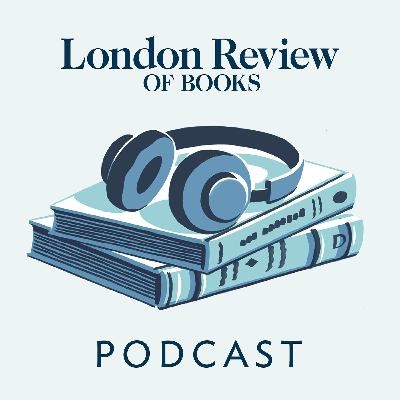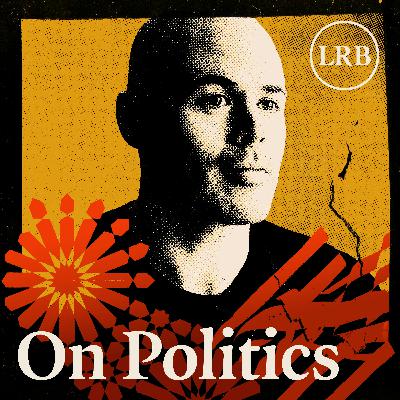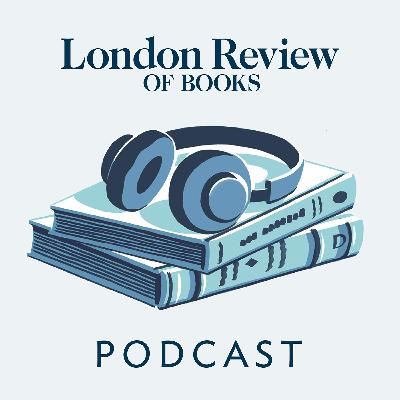Discover The LRB Podcast
The LRB Podcast

The LRB Podcast
Author: The London Review of Books
Subscribed: 8,816Played: 166,035Subscribe
Share
© LRB (London) Ltd 1980 - 2021
Description
The LRB Podcast brings you weekly conversations from Europe’s leading magazine of culture and ideas, hosted by Thomas Jones and Malin Hay, and featuring our fortnightly 'On Politics' podcast hosted by James Butler.
From the LRB
Subscribe to the LRB: https://lrb.me/subslrbpod
Close Readings podcast: https://lrb.me/crlrbpod
LRB Audiobooks: https://lrb.me/audiobookslrbpod
Bags, binders and more at the LRB Store: https://lrb.me/storelrbpod
Get in touch: podcasts@lrb.co.uk
423 Episodes
Reverse
Did Dickens ruin Christmas? He was certainly a pioneer in exploiting its commercial potential. A Christmas Carol sold 6,000 copies in five days when it was published on 19 December 1843, and Dickens went on to write four more lucrative Christmas books in the 1840s. But in many ways, this ‘ghost story of Christmas’ couldn’t be less Christmassy. The plot displays Dickens’s typical obsession with extracting maximum sentimentality from the pain and death of his characters, and the narrative voice veers unnervingly from preachy to creepy in its voyeuristic obsessions with physical excess. The book also offers a stiff social critique of the 1834 Poor Law and a satire on Malthusian ideas of population control.
In this long extract from ‘Novel Approaches’, part of our Close Readings podcast, Colin Burrow and Clare Bucknell join Tom to consider why Dickens’s dark tale has remained a Christmas staple.
This is an extract from the episode. To listen in full, and to all our other Close Readings series, sign up:
Directly in Apple Podcasts: https://lrb.me/applecrna
In other podcast apps: https://lrb.me/closereadingsna
AUDIO GIFTS
Close Readings and audiobooks: https://lrb.me/audiogifts
Emily Brontë died on 19 December 1848. As Patricia Lockwood said in an episode of Close Readings, there is evidence that Brontë was writing a second novel to follow ‘Wuthering Heights’, but if she was, it has been lost, and it has been suggested, though never proved, that her sister Charlotte might have destroyed it. But what could possibly be in that lost novel, Lockwood wondered, that was worse, more unacceptable, than what we find in ‘Wuthering Heights’?
To mark the anniversary, we’re releasing the full version of this episode from the Close Readings series ‘Novel Approaches’. David Trotter and Patricia Lockwood join Thomas Jones to discuss Brontë’s only surviving novel, one Trotter describes as ‘completely amoral’.
Readings by Alex Colley
Give a gift subscription to Close Readings for Christmas: https://lrb.me/audiogifts
From the LRB
Subscribe to the LRB: https://lrb.me/subslrbpod
Close Readings podcast: https://lrb.me/crlrbpod
LRB Audiobooks: https://lrb.me/audiobookslrbpod
Bags, binders and more at the LRB Store: https://lrb.me/storelrbpod
Get in touch: podcasts@lrb.co.uk
For a century, Judy Garland’s joyous and vulnerable singing voice has captivated audiences at the theatre, over the airwaves and in the cinema. Camille Paglia wrote of her that she ‘became an emblematic personality of her time, into whom the mass audience projected its hopes and disappointments’. Bee Wilson joins Malin Hay to discuss Garland’s years at MGM Studios, where she was mistreated and overworked by her employers but also made some of her best pictures, growing from a contract player into a star. They discuss whether Garland’s work at MGM was worth the pain it caused her, who her greatest collaborators were, and who now owns her story.
Listen to Bee read her pieces in the audiobook Complicated Women, which includes an introductory conversation between Bee and Malin: https://lrb.me/audiobookspod
From the LRB
Subscribe to the LRB: https://lrb.me/subslrbpod
Close Readings podcast: https://lrb.me/crlrbpod
LRB Audiobooks: https://lrb.me/audiobookslrbpod
Bags, binders and more at the LRB Store: https://lrb.me/storelrbpod
Get in touch: podcasts@lrb.co.uk
The politics of migration have driven some of the most consequential changes in Britain’s recent history and look set to dominate the next general election. Since the end of Rishi Sunak’s government, the crossings of ‘small boats’ over the English Channel and the use of ‘asylum hotels’ have become a focal point for protest, violence and escalating rhetoric, leading most recently to significant changes in the migration system proposed by the home secretary, Shabana Mahmood. To assess these changes and explain how Britain’s asylum system works, James is joined by Colin Yeo, a barrister and author of Welcome to Britain: Fixing Our Broken Immigration System, and Nicola Kelly, a former Home Office civil servant and author of Anywhere But Here: How Britain’s Broken Asylum System Fails Us All.
Read more on politics in the LRB: https://lrb.me/lrbpolitics
From the LRB
Subscribe to the LRB: https://lrb.me/subslrbpod
Close Readings podcast: https://lrb.me/crlrbpod
LRB Audiobooks: https://lrb.me/audiobookslrbpod
Bags, binders and more at the LRB Store: https://lrb.me/storelrbpod
Get in touch: podcasts@lrb.co.uk
Fatma Hassona was a Palestinian photographer from Gaza City who was killed with her family by an Israeli airstrike in April 2025. A year earlier, the Iranian filmmaker Sepideh Farsi began recording video conversations with Hassona about her life and work under Israeli bombardment, which became the film Put Your Soul on Your Hand and Walk. In this episode, Adam Shatz talks to Farsi about the process of making the film, the connection she formed with Hassona, and the practical and ethical challenges of documenting Israel’s devastation of Gaza and its people.
From the LRB
Subscribe to the LRB: https://lrb.me/subslrbpod
Close Readings podcast: https://lrb.me/crlrbpod
LRB Audiobooks: https://lrb.me/audiobookslrbpod
Bags, binders and more at the LRB Store: https://lrb.me/storelrbpod
Get in touch: podcasts@lrb.co.uk
We’re pleased to announce our four new Close Readings series starting in January next year:
‘Who’s Afraid of Realism?’ with James Wood and guests
‘Nature in Crisis’ with Meehan Crist and Peter Godfrey-Smith
‘Narrative Poems’ with Seamus Perry and Mark Ford
‘London Revisited’ with Rosemary Hill and guests
Bonus Series: 'The Man Behind the Curtain’ with Tom McCarthy and Thomas Jones
Episodes will appear on Monday every week, with a new episode from each series appearing every four weeks. Episodes from our bonus series, ‘The Man Behind the Curtain’, will come out every couple of months, either as extra episodes or live events: look out for announcements!
If you're not already subscribed to Close Readings, sign up for just £4.99/month or £49.99/year to listen to these series plus all our past series in full:
Apple Podcasts: https://lrb.me/crintro2026apple
Spotify and other podcast apps: https://lrb.me/crintro2026sc
Here are the works covered in each series:
‘Who’s Afraid of Realism?’ with James Wood and guests
Flaubert, ‘Madame Bovary’
Dostoevsky, ‘Notes from Underground’
Stories by Anton Chekhov
Tolstoy, ‘The Death of Ivan Ilyich’
Kafka, ‘Metamorphosis’
Woolf, ‘Mrs Dalloway’
Rhys, ‘Voyage in the Dark’
Bellow, ‘Seize The Day’
Nabokov, ‘Pnin’
Spark, ‘The Prime of Miss Jean Brodie’
Sharma, ‘Family Life’
Stories by Lydia Davis
Riley, ‘My Phantoms’
‘Nature in Crisis’ with Meehan Crist and Peter Godfrey-Smith
Carson, ‘Silent Spring’
Schlanger, ‘The Light Eaters’
Czerski, ‘The Blue Machine’
Lovelock, ‘Gaia’
MacFarlane, ‘Is a River Alive?’
Kimmerer, ‘Braiding Sweetgrass’
Raboteau, ‘Lessons for Survival’
Moore and Roberts, ‘The Rise of Ecofascism’
Riofrancos, ‘Extraction: The Frontiers of Green Capitalism’
And more TBD
‘Narrative Poems’ with Seamus Perry and Mark Ford
Marlowe, ‘Hero and Leander’
Shakespeare, ‘Venus and Adonis’ and ‘The Rape of Lucrece’
Milton, Book 9 of ‘Paradise Lost’
Pope, ‘The Rape of the Lock’
Coleridge ‘The Rime of the Ancient Mariner’
Wordsworth, ‘The Ruined Cottage’ and ‘Michael’
Keats, ‘The Eve of St Agnes’
Byron, ‘Childe Roland’
Clough, ‘Amours de Voyage’
Tennyson, ‘Enoch Arden’
H.D., ‘Helen in Egypt’
Set, ‘The Golden Gate’
Carson, ‘Autobiography of Red and ‘Red Doc>’
‘London Revisited’ with Rosemary Hill
Each episode will cover a period of London’s history and begin with a piece of writing. The first episode, on Roman London, will start with an extract from Dio Cassius’s account of the Roman conquest from his Roman History.
‘The Man Behind the Curtain’ with Tom McCarthy and Thomas Jones
Cervantes, ‘Don Quixote’
Shelley, ‘Frankenstein’
Eliot, ‘Middlemarch’
Wells, ‘The Invisible Man’
Joyce, ‘Ulysses’
Pynchon, Gravity’s Rainbow’
The BBC is in crisis, again. A leaked dossier alleging a lack of impartiality in its reporting on Trump, Israel, race and gender has felled its director general and drawn threats of a defamation lawsuit from the White House. Yet many at the corporation point to the dossier’s culture war slant as evidence of a right-wing plot against the BBC. Defensive and stolid, Britain’s main news and media organisation now flinches from any real conflict. Is the BBC capable of surviving in the digital era? Joining James is the former BBC journalist Lewis Goodall, now a prominent face of digital political journalism as part of the News Agents, and Dan Hind, publisher and author of The Return of the Public: Democracy, Power and the Case for Media Reform.
Read more on politics in the LRB: https://lrb.me/lrbpolitics
More from the LRB
Subscribe to the LRB: https://lrb.me/subslrbpod
Close Readings podcast: https://lrb.me/crlrbpod
LRB Audiobooks: https://lrb.me/audiobookslrbpod
Bags, binders and more at the LRB Store: https://lrb.me/storelrbpod
Get in touch: podcasts@lrb.co.uk
In the days after 9/11, George W. Bush declared a state of emergency and initiated what would become an unprecedented expansion of US power. Public debate narrowed: there were new limits on what was acceptable, and not acceptable, to say. The London Review of Books published a number of pieces that challenged this consensus, forcing its editor, Mary-Kay Wilmers, to defend the paper on national radio.
This is the first episode in a six-part series. To listen to the rest of the series follow Aftershock: The War on Terror in:
Apple Podcasts: https://lrb.me/wotapple
Spotify: https://lrb.me/wotspotify
Other podcast apps: https://lrb.me/wotlinktree
Archive:Rutgers Law Review, ‘CNN Live’/CNN, ‘Good Morning America’/ABC, ‘Good Day New York’/FOX5 New York/FOX, ‘SmackDown’/USA Network/WWE, ‘Meet the Press’/NBC/NBC News Productions and ‘Broadcasting House’/BBC Radio 4/BBC
Since the 1980s, Brett Christophers wrote recently in the LRB, ‘firms have made vast amounts of money by sending the rich world’s waste to the global South’ – hazardous waste at first, joined more recently by discarded electronics, clothes and plastics. Literal mountains of our rubbish are accumulating on the peripheries of cities such as Accra and Delhi. Waste, like wealth, is unevenly distributed.
On this episode, Brett joins Tom to discuss what happens to our rubbish after we throw it away. They talk about where it goes and why it’s so difficult actually to get rid of it, let alone reduce the amount we discard, when the creation of waste is so much more profitable.
Find further reading on the episode page: https://lrb.me/wastepod
From the LRB
Subscribe to the LRB and get a free tote! https://lrb.me/subslrbpod
Close Readings podcast: https://lrb.me/crlrbpod
LRB Audiobooks: https://lrb.me/audiobookslrbpod
Bags, binders and more at the LRB Store: https://lrb.me/storelrbpod
Get in touch: podcasts@lrb.co.uk
After 9/11, George W. Bush launched a global War on Terror. What followed was an unprecedented expansion of American power, from Guantánamo Bay to drone strikes, mass surveillance to the weaponisation of the financial system. Asked when it would end, Vice-President Dick Cheney replied: ‘Not in our lifetime.’ Two decades later, we’re still living in its shadow.
Aftershock: The War on Terror is a new six-part podcast from the London Review of Books. Daniel Soar, a senior editor at the paper, revisits the magazine’s coverage and reflects on the ways 9/11 has changed the world we live in.
First episode coming 20 November. Find the series in:
Apple Podcasts: https://lrb.me/f16f79
Spotify: https://lrb.me/eb54a6
Or wherever you get your podcasts.
At the end of the 20th century and across the first decade of the 21st, a swathe of countries across Latin America elected left-wing governments in what became known internationally as the Pink Tide. In more recent years, what many have seen as a second wave of progressive governments have collapsed, giving way to right-wing leaders such as Milei, Bukele and Bolsonaro, with support from international libertarian movements. In this episode, James is joined by Tony Wood, who wrote about this shift in the latest issue of the LRB, and Camila Vergara, a critical legal theorist at the University of Essex, to discuss why the Pink Tide governments failed, where the new brand of right-wing politics comes from, and whether the revolutionary energy found across the continent could lead to further change.
Read more on politics in the LRB: https://lrb.me/lrbpolitics
From the LRB
Subscribe to the LRB: https://lrb.me/subslrbpod
Close Readings podcast: https://lrb.me/crlrbpod
LRB Audiobooks: https://lrb.me/audiobookslrbpod
Bags, binders and more at the LRB Store: https://lrb.me/storelrbpod
Get in touch: podcasts@lrb.co.uk
Between the 1960s and the turn of the century, an astonishingly large number of serial killers grew up or operated in America’s Pacific Northwest. Caroline Fraser’s book Murderland, reviewed in the LRB by James Lasdun, argues that a significant contributing factor may have been the spew of lead fumes and other toxic emissions that billowed unchecked across the region during those decades. On this episode, James joins Tom to discuss the evidence, and what the juxtaposition of industrial lead poisoning and serial murder may tell us about different kinds of violence in modern America, even if a direct causal link remains unproved.
Find the piece and further reading on the episode page: https://lrb.me/leadpollutionpod
Read more from James Lasdun for the LRB in the archive: https://www.lrb.co.uk/contributors/james-lasdun
From the LRB
Subscribe to the LRB and get a free tote! https://lrb.me/subslrbpod
Close Readings podcast: https://lrb.me/crlrbpod
LRB Audiobooks: https://lrb.me/audiobookslrbpod
Bags, binders and more at the LRB Store: https://lrb.me/storelrbpod
Get in touch: podcasts@lrb.co.uk
Andy Burnham recently said that the government is ‘in hock to the bond markets’, and the political turbulence of the past few years, not least the downfall of Liz Truss following her ‘mini-budget’, would seem to back this up. But the bond markets are only part of the picture: the actions of the Bank of England and the fiscal rules a government sets for itself also play significant roles in the decisions a chancellor can make. In this episode James is joined by former Bank of England chief economist Andy Haldane and Daniela Gabor, professor of economics at SOAS, to consider why governments are so afraid of ‘bond vigilantes’ and the increasing influence of central banks on policy since the financial crisis of 2008. Should the Bank of England remain independent? And what room for manoeuvre does Rachel Reeves have in her budget next month?
Read more on politics in the LRB: https://lrb.me/lrbpolitics
From the LRB
Subscribe to the LRB: https://lrb.me/subslrbpod
Close Readings podcast: https://lrb.me/crlrbpod
LRB Audiobooks: https://lrb.me/audiobookslrbpod
Bags, binders and more at the LRB Store: https://lrb.me/storelrbpod
Get in touch: podcasts@lrb.co.uk
One of the difficulties in thinking about extinction, as Lorraine Daston argued in her recent review of Vanished by Sadiah Qureshi, is ‘the challenge of scale: the mismatch between our decades and centuries and the Earth’s epochs and aeons’.
Lorraine joins Tom to explore the ways that ideas about extinction are warped by our timescales and politics. They discuss how the language of natural selection was used to excuse violence and ecocide, and the continued influence of ‘empirical’ myths on approaches to conservation and human culture today.
Find further reading on the episode page: https://lrb.me/evolutionpod
From the LRB
Subscribe to the LRB: https://lrb.me/subslrbpod
Close Readings podcast: https://lrb.me/crlrbpod
LRB Audiobooks: https://lrb.me/audiobookslrbpod
Bags, binders and more at the LRB Store: https://lrb.me/storelrbpod
Get in touch: podcasts@lrb.co.uk
For the best part of a decade, a new type of anti-systemic, nationalist politics has been emerging from different corners of the online world. In Britain, this has united with older forms of cultural conservatism to propel Nigel Farage and Reform UK to within touching distance of power (at least for now). In this episode, James is joined by political theorist Alan Finlayson to understand what’s driving these changes and the ways in which different styles of online rhetoric, on both the left and right, are shaping our political discourse. They also consider whether the distinction between left and the right is still meaningful and why the way we understand equality has become the fundamental political dividing line.
Alan Finlayson is professor of political and social theory at the University of East Anglia.
Read more on politics in the LRB: https://lrb.me/lrbpolitics
From the LRB
Subscribe to the LRB: https://lrb.me/subslrbpod
Close Readings podcast: https://lrb.me/crlrbpod
LRB Audiobooks: https://lrb.me/audiobookslrbpod
Bags, binders and more at the LRB Store: https://lrb.me/storelrbpod
Get in touch: podcasts@lrb.co.uk
Adam is joined by Robert Malley to discuss the ceasefire between Israel and Hamas, and the long history of the peace process, in which Malley has been involved on behalf of several US administrations. They also talk about his recent book about the conflict, Tomorrow Is Yesterday, co-authored with Hussein Agha, why attempts to broker a lasting peace have failed and what the future might hold for the Palestinian movement.
Find further reading on the LRB website: https://lrb.me/peaceprocesspod
From the LRB
Subscribe to the LRB: https://lrb.me/subslrbpod
Close Readings podcast: https://lrb.me/crlrbpod
LRB Audiobooks: https://lrb.me/audiobookslrbpod
Bags, binders and more at the LRB Store: https://lrb.me/storelrbpod
Get in touch: podcasts@lrb.co.uk
It's nearly eighteen years since Amanda Knox was arrested on suspicion of murdering her housemate Meredith Kercher in Perugia, and more than ten since she was finally exonerated of the crime. She has just written her second book, Free, which, as Jessica Olin wrote recently in the LRB, ‘chronicles her attempt to adjust to life after prison’.
On this episode of the LRB podcast, Jessica joins Tom to talk about the murder case, the media frenzy surrounding it – which portrayed Knox as either a sex-crazed psychopath or an angelic innocent abroad – and the efforts Knox has since made to speak for herself and on behalf of others who have been wrongly convicted.
From the LRB
Subscribe to the LRB: https://lrb.me/subslrbpod
Close Readings podcast: https://lrb.me/crlrbpod
LRB Audiobooks: https://lrb.me/audiobookslrbpod
Bags, binders and more at the LRB Store: https://lrb.me/storelrbpod
Get in touch: podcasts@lrb.co.uk
In its nearly two hundred years of existence the Conservative Party has survived through a combination of protean adaptability and ruthlessness, not least in its willingness to change leaders. Yet under its present leader, Kemi Badenoch, the party often described (by itself, at least) as the natural party of government appears to be facing a unique moment of peril. Polling now places Reform UK as the leading party of the right while Badenoch has presided over a steady stream of high-profile defections to Nigel Farage’s party, including one of her own MPs, and enormous losses in local elections. For this episode James Butler is joined by Anthony Seldon, a prolific historian of recent Tory administrations, and Henry Hill, deputy editor of Conservative Home, to consider what or who is to blame for the party’s dire situation and whether it will still be around to celebrate its bicentennial in 2034.
From the LRB
Subscribe to the LRB: https://lrb.me/subslrbpod
Close Readings podcast: https://lrb.me/crlrbpod
LRB Audiobooks: https://lrb.me/audiobookslrbpod
Bags, binders and more at the LRB Store: https://lrb.me/storelrbpod
Get in touch: podcasts@lrb.co.uk
Elmore Leonard ‘did more with less than any crime writer I can think of’ J. Robert Lennon wrote in the latest issue of the LRB. Leonard was born in New Orleans in 1925 and by the time he died in 2013 had published over forty novels selling tens of millions of copies, many of which were made into films such as Jackie Brown and Get Shorty. (A few have recently been reissued as Penguin Modern Classics.) He also wrote ten rules for writers that serve as a manifesto for the minimalist, dialogue-heavy style he mastered. In this episode Lennon joins Tom to discuss the usefulness of Leonard’s rules and the ways in which great crime writing will always defy the prescriptions of its genre.
Read J. Robert Lennon on Leonard: https://lrb.me/leonardpod
From the LRB
Subscribe to the LRB: https://lrb.me/subslrbpod
Close Readings podcast: https://lrb.me/crlrbpod
LRB Audiobooks: https://lrb.me/audiobookslrbpod
Bags, binders and more at the LRB Store: https://lrb.me/storelrbpod
Get in touch: podcasts@lrb.co.uk
When Keir Starmer brought Labour back to government last year with a majority of 174, many talked about two or even three terms in power. But over fourteen months the prime minister has run into numerous problems, losing both Angela Rayner as deputy PM and Peter Mandelson as US ambassador (to different scandals), and facing formidable opposition from Nigel Farage’s Reform party riding high on the issue of immigration control. In this first episode of a new strand in the LRB Podcast, host James Butler talks to former Labour MP and minister Chris Mullin, columnist Andy Beckett and journalist Morgan Jones about whether Labour can recover from critical mistakes over tax, why they’re failing to communicate their achievements, and who they should really be trying to represent.
This was our first episode. Tell us what you think! https://lrb.me/opfeedback
From the LRB
Subscribe to the LRB: https://lrb.me/subslrbpod
Close Readings podcast: https://lrb.me/crlrbpod
LRB Audiobooks: https://lrb.me/audiobookslrbpod
Bags, binders and more at the LRB Store: https://lrb.me/storelrbpod
Get in touch: podcasts@lrb.co.uk









hadn’t known how much i’d missed james b and his dulcet tones. do now, though! big love buddy
Sadly, the question remained unanswered and the guest was unclear as to whether it was even worth asking. The fact that our individual freedoms and rights are under attack however is not in doubt.
So Sartre was a poseur, a self serving phony and a first class fraud. He was a Nazi collaborator who lied about his role in the French resistance. While he lived, sadly, no one dated to call his bluff. Can anyone today speak rationally about "existentialism"? In terms of his work "Being and Nothingness," existentialism is the nothingness part. https://slate.com/news-and-politics/2007/03/the-problem-with-sartre.html
I gather you believe there are no Jewish women novelists worth talking about.
This was the absolute best, most honest, most insightful discussion on the brutal treatment of Palestinians at the hands of the Israelis and the US that has ever been broadcast. Can the world muster the courage to defend the people of Palestine? The most hopeful sign is that in the US young people are almost universally supporting the Palestinians.
The death count in Gaza is now 30,000, their homes are in rubble. They lack food and water. All the hospitals, schools, and infrastructure in Gaza have been destroyed. There are over 100,000 Gaza who have been wounded and maimed. This is a clear genocide and the prelude to an Israeli take over of Gaza by Israel. Israel has taken 10,000 hostages from the West Bank, imprisoning them without charge. The western press calls them "prisoners" but they are hostages, many of them women and children.
Camus characterizing the American negro community as colonial is apt. If you require public transportation to get around in a city, you likely grasp my assertion as correct. If you defend the obnoxious deportment of street level negros, you are either blithely protected and have soundproof sanctuary or a, to put it bluntly, "wigger."
You had a perfect opportunity to say "but will it play in Peoria" and didn't take it!!!!!!
Meehan Crist speaks to Banu Subramaniam: I understand how the guest is able to analogize invasion and colonization by people and by plants and animals, and the genocide of natives is parallel to the extinction of native species, but this last is not mentioned. Is it not worth considering the destruction of species in Hawaii by the arrival first of Polynesians, and then by Americans? Where I live, in oregon, large areas on the coast are infested not only with Scotch broom, a horticultural escapee, but also the somewhat similar appearing gorse. Much of her argument makes sense to me, but the omission of extinctions is an important one.
it was a silly hit piece book. reviewed by silly lefties.
Loved this episode. Learnt so much about the situation in #Palestine and #Israel
Colourful overview of RLS's time in Bournemouth and the bombing of his former residence during WW2. On writing through missing buildings and "constantly arguing with time" - Andrew O'Hagan.